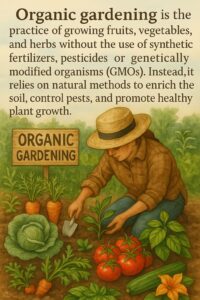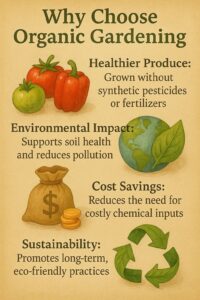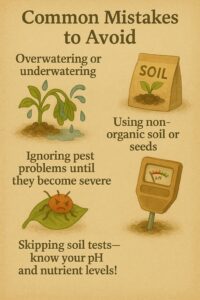Organic Gardening at Home: A Beginner’s Guide to Chemical-Free Produce
With rising concerns about food safety and a growing desire for healthy living, many people are turning to organic gardening as a way to ensure their fruits and vegetables are free from harmful chemicals. Whether you have a sprawling backyard or just a few containers on a balcony, organic gardening is an accessible and rewarding way to grow your own food.
This beginner-friendly guide will walk you through the essentials of starting your own organic garden at home, so you can enjoy fresh, chemical-free produce right from your backyard.
What is Organic Gardening?
Organic gardening is the practice of growing fruits, vegetables, and herbs without the use of synthetic fertilizers, pesticides, or genetically modified organisms (GMOs). Instead, it relies on natural methods to enrich the soil, control pests, and promote healthy plant growth.
The main goal is to work in harmony with nature, creating a sustainable, eco-friendly garden that benefits both the environment and your health.

Why Choose Organic Gardening?
• Healthier Produce: Organic fruits and vegetables are free from synthetic chemicals, making them safer for consumption.
• Environmental Impact: Organic gardening reduces pollution, conserves water, and supports biodiversity.
• Cost Savings: Once established, an organic garden can save you money on grocery bills.
• Sustainability: Composting, crop rotation, and other organic techniques support long-term soil health and food security.

Getting Started: Step-by-Step Guide
1. Choose the Right Location
Select a spot that receives at least 6-8 hours of sunlight per day. Make sure it’s close to a water source and has good air circulation. Raised beds or containers can also be a great option for small spaces or urban environments.
2. Build Healthy Soil
Soil is the foundation of organic gardening. Instead of synthetic fertilizers, enrich your soil using:
• Compost: Add kitchen scraps, grass clippings, and leaves to a compost pile. This will create nutrient-rich soil over time.
• Organic Mulch: Mulch helps retain moisture, suppress weeds, and gradually improves soil quality.
• Worm Castings or Manure: These natural amendments provide essential nutrients to your plants.
Healthy soil = healthy plants.
3. Select Organic Seeds or Seedlings
Always choose certified organic seeds or seedlings to ensure your garden is free from genetically modified plants and treated chemicals. Start with easy-to-grow vegetables like:
• Tomatoes
• Lettuce
• Carrots
• Spinach
• Zucchini
• Herbs like basil, mint, and parsley
4. Practice Natural Pest Control
Instead of using chemical pesticides, try these natural solutions:
• Neem Oil: A natural insecticide safe for plants and pollinators.
• Companion Planting: Planting marigolds, basil, or garlic near vegetables helps repel pests.
• Physical Barriers: Use netting or row covers to keep insects away.
• Encourage Beneficial Insects: Ladybugs, lacewings, and bees help control pests and pollinate your crops.
5. Water Wisely
Water deeply but infrequently to encourage deep root growth. Use drip irrigation or soaker hoses to conserve water and reduce fungal diseases. Early morning is the best time to water your plants.
6. Rotate Crops and Rest Your Soil
Avoid planting the same type of crop in the same spot every year. Crop rotation helps prevent disease build-up and balances nutrient levels in the soil. You can also let a section of your garden “rest” by planting cover crops like clover or beans, which enrich the soil.

Common Mistakes to Avoid
• Overwatering or underwatering
• Using non-organic soil or seeds
• Ignoring pest problems until they become severe
• Skipping soil tests—know your pH and nutrient levels!

Final Thoughts
Organic gardening is more than just a hobby—it’s a step toward a healthier, more sustainable lifestyle. While it may take a bit more effort and patience than conventional gardening, the rewards are worth it. You’ll enjoy fresh, flavorful produce and the satisfaction of knowing exactly what’s in your food.
So grab a shovel, start composting, and get your hands dirty—your organic home garden awaits!
